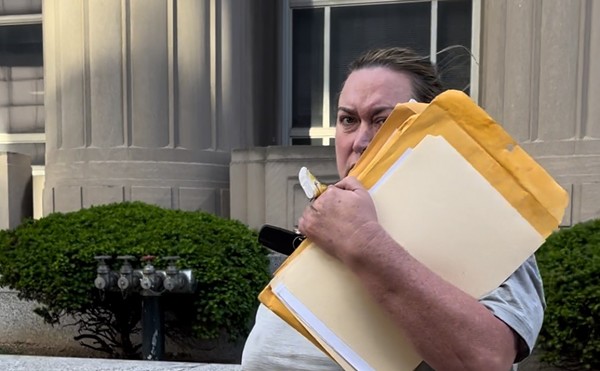On Friday, May 4, hours after St. Louis Post-Dispatch editor Arnie Robbins gave his employer, Lee Enterprises, two weeks' notice, Ellen Soeteber, who'd preceded Robbins at the helm of the Post, lofted a brief e-mail to RFT from her home in south Florida, saying she wanted to talk.
We didn't have to think twice about taking her up on the offer.
Aside from a few journalism-review postmortems after her abrupt departure in late 2005, Soeteber hasn't spoken publicly about the Post. And not for lack of caring — she grew up in the Metro East, worshiping the St. Louis daily. At some level, then-Post publisher Terrance C.Z. Egger's offer of the paper's editorship was a cosmic alignment (though as things worked out, a black hole might be a better analogy).
What's more, Soeteber had plenty of detractors during her tenure, and she was never shy about sharing her thoughts.
Put it this way: If Arnie Robbins' resignation remarks were a cocktail, they'd be a Shirley Temple. Soeteber's? Think rusty nail.
When Soeteber stepped down from the Post in late 2005 in the turbulent wake of parent Pulitzer Inc.'s acquisition earlier that year by Davenport, Iowa-based Lee Enterprises, she readily acknowledged that she'd butted heads with management over newsroom resources (including her own salary). She didn't cite the paper's recently announced plan to cut its newsroom staff by 12 percent through voluntary buyouts, but she didn't have to. Instead she said, "I don't want to dwell on those aspects, as they were not the only factors in this decision. It's just time to go. Sometimes, things are as simple as that and as complicated as that."
And off she went, back to Fort Lauderdale, the town she'd left in 2001 when Egger enticed her away from the Sun-Sentinel, where she was managing editor, to take over St. Louis' storied daily. (Egger had already parted ways with Cole Campbell, whose three-year endeavor to reinvent the Post's newsroom as a bastion of "civic journalism" had been unanimously branded a flop.)
We spoke with Soeteber by phone and exchanged questions and answers over e-mail. Having only recently fully recovered from two hip replacements necessitated by an uncommonly pernicious form of arthritis, she exercised admirable forbearance.
Riverfront Times: The Post made its debut in 1878. You came aboard 123 years later — the paper's sixth editor-in-chief in all that time (and first woman editor-in-chief). Now, over the course of barely a decade, the Post has cycled through three top editors. Um, climate change?
Ellen Soeteber: Editors in general turn over more quickly these days. My five-year tenure and Arnie's of six and a half years are pretty good as things go today. The Post's first three editors were all named Joseph Pulitzer. It was privately owned for most of that time. The P-D's historic reputation is due entirely to the second Joseph Pulitzer, who I think is the most underrated editor-publisher in U.S. journalism.
Don't short the founding J.P. He was no slouch. A rogue and a blowhard, maybe, but he also gave the Post its hallowed "Platform": Down with demagogues and public plunderers, and all that. At any rate, it's tactful of you to take the high road, but the elephant in the room is Joseph Pulitzer III. He of the Monets, the Picassos, the Matisses and Cezannes.
The founding J.P. abandoned St. Louis for fame and fortune in New York City, where he eventually bestowed his guilt money to Columbia University and the Pulitzer Prizes. He left in St. Louis what he thought was his least talented son to run the P-D. The other two sons ran his NYC operation into the ground.
The third J.P., known as Joseph Pulitzer Jr., apparently felt a great obligation to uphold the family legacy in the Post-Dispatch. He took the company public in a move he thought would save the newspaper. But no question, his first love seems to have been art, and he had a great eye for it.
When Terry Egger was recruiting me to come to the P-D from Florida, he told me that [J.P. Jr.'s widow] Emily Pulitzer wanted to make the Post-Dispatch a great newspaper again before she died. At the time she was only in her 60s and had long family bloodlines. So this goal was a seductive proposition. I think we were well on the way toward achieving that goal, but it all got cut down midway.
As in, she sold out the family's majority share of Pulitzer Inc. [which had gone public in the mid-1980s] at the very top of the market. Lee Enterprises, a Lilliputian newspaper company by comparison, swooped in from Davenport, Iowa (if one can be said to "swoop" anywhere from Davenport, Iowa), and bought Pulitzer for $1.46 billion — every cent of which (and more) it had to borrow.
Things could have been different. I hoped that Emily Pulitzer would buy out the rest of her family — she already had bought much of her brother-in-law Michael Pulitzer's holdings — and take it private under the ownership of her foundation, or a new foundation. Like the Poynter Institute's ownership of the St. Petersburg Times [recently rechristened the Tampa Bay Times] in Florida. Around the time Pulitzer Inc. was being sold, a family newspaper company in one of the southern states did just that.
The Pulitzers could have sold off the company's smaller newspapers to Lee — they would have been a better fit with Lee, which had never run a major metro paper. But I don't think it was in the financial interests of the outside advisers — led by Goldman Sachs — nor of the top execs and stockholders to do anything other than just sell the company. Mrs. Pulitzer certainly made another fortune on the sale. Her art collection probably was already worth more than the newspaper.
She got $400 million out of the deal. Terry Egger got something for his troubles as well; his Pulitzer holdings were worth more than $9 million when Lee bought the company for $64 a share.
Of course, that's assuming he sold his shares. Lee was trading at about $45 per share when the sale went through. Now it's more like $1.20. Just think: Emily Pulitzer could buy back her empire for less than $60 million! She could probably scrape up that much from between her sofa cushions — and she'd get all Lee's Podunk papers too. How much, if any, Pulitzer stock did you own?
Check the P-D's news reports of the time, especially those by Christopher Carey. Mrs. Pulitzer's gain was considerable larger than what you state. She owned more than half the company, as I recall.
I didn't own much Pulitzer stock. I wasn't an officer of Pulitzer Inc. — only of the Post-Dispatch. I owned a lot of Tribune Co. stock, because I had worked there for 28 years, and they had replaced their pension plans with stock ownership. Just by luck, the move to the P-D got me to sell when TribCo [which filed for bankruptcy protection in 2008 and has yet to re-emerge] was still a profitable hulk.
News reports at the time indicated that you were optimistic about the Post's future under Lee, despite the fact that the company was anything but the second coming of the Poynter Institute. Why the sunny outlook? And at what point did the clouds roll in?
I was optimistic at first. Many of us were glad we hadn't been acquired by [USA Today parent company] Gannett, although in retrospect that might have been better. Gannett has tough rules, but you know what they are. Also, Lee made a lot of promises earlier on, but these quickly began to look shaky. It became clear that my ideas were not compatible with Lee's.
Having grown up on the East Side, you were familiar with the St. Louis area — did you jump into the new job with both feet?
Well, I wouldn't have left my tropical home in Fort Lauderdale — and Tribune Co., where I'd worked since college — if 1) this weren't my hometown newspaper and 2) I didn't think I could bring about meaningful change, accomplish some things that would matter.
Of course I jumped in with both feet. Anyone who has ever worked with me will tell you I don't do anything slowly. Patience does not come naturally to me.
You mention my being an East Side native. A funny thing happened early on: My husband and I arrived at Lambert, and he was getting a car at Hertz. He was using an AmEx card I still had from Tribune Co. The counterman asked what "Tribune" is, and when told it is a newspaper company, this delightful man said: "Well, we have a new editor of the Post-Dispatch! And she's from East St. Louis!"
I was astonished. I learned quickly that I would be recognized as I moved around the St. Louis area, which doesn't happen to editors in most cities. I preferred not to be. My husband bought me better sweat clothes for my morning walks.
On the other hand, I enjoyed getting out into our communities. I did that a lot. Many people thought the P-D was arrogant, remote, too liberal. I loved engaging readers, parrying with them, and trying to change our outside image to something more human.
What were your impressions of the newsroom on your first day at work, in January 2001?
I grew up reading the Post-Dispatch, and it inspired me to become a journalist. But the newspaper had deteriorated significantly. It was out of touch with the national media environment and with much of the St. Louis region.
Change was often difficult at the P-D. Actually, it became easier to achieve in our newsrooms than in the rest of the organization, which was amazingly antiquated. For example, basic personnel records, such as payroll, were still done with paper and pencil. (Of course, Terry Egger and the VPs who reported to him were mostly new, too, and trying to bring about change in their own areas.)
The fact that I followed Cole Campbell, who was despised by most of the newsroom, made some of the changes there easier. (I liked Cole, who was quite gracious to me. He was a brilliant mind who never saw a new journalism theory he didn't want to try.) I was seen as the non-Cole. And people wanted to get the news operation out of Cole's experiments, fast. Unfortunately, some folks thought that meant going back to operating just as things had been before.
We tore up the newsroom organization within the first few months, and the new structure was a more traditional one. But nothing was to move backward, as far as I was concerned.
There were respected veterans who would note that the P-D was no longer read in the White House, as it was reported to have been by President Kennedy. The implication was that if in 2001 we re-created the newspaper of 40 years earlier, we would be great and successful again — as though times had never changed.
About how many reporters and editors were working in the newsroom when you took over?
I think it was 290-something. Later, we were able to add a few staffers to expand Business and start the Health & Fitness section. [According to the stltoday.com website, the newsroom population now numbers 150.]
Does that include the Suburban Journals staff? How much content migrated from those bureaus into the pages of the Post?
No, the Suburban Journals' operations were kept strictly separate. As part of the regional strategy we developed, I hoped to make use of their community reporters as P-D stringers, but no one in top management would touch this. They were afraid it could create an opportunity for the [St. Louis Newspaper] Guild. The Journals' pay was considerably less than the P-D's, as you might imagine.
You were at the helm for nearly five years. What, would you say, were the Post's five proudest moments during that time period?
I can't say there were five "moments." There were many good moments. I loved working there for most of my tenure.
Certainly, I was proud of the changes we were able to bring about in the focus of the paper — making it more timely, interesting, competitive and relevant to readers. This culminated in the dramatic reshaping of local-news strategy, and the design finally launched in 2005. This initiative, combined with a smart marketing push led by circulation director Steve Helms, showed that it was still possible to gain readers and advertisers with a strong, relevant product. That effort gained the P-D nearly 14,000 new home-delivery customers, many on the East Side, which is the most competitive part of the market.
I am also proud of how we were able to increase diversity among the news staff: Minority-group representation grew by 30 percent. The staff also became more diverse in terms of age, interests, background, expertise.
The business sections became a source of pride under Andre Jackson and a talented staff, many of them new hires. Kathy Best and Adam Goodman brought aggressive enterprise to metro news.
We had some real high points in public service, such as Deb Shelton's and Greg Freeman's work on organ transplants; Elizabethe Holland's and Susan Weich's work uncovering manipulation of suburban fire-department salaries and taxes; investigations of nursing homes, Madison County courts, dangerous floodplain building and many other good projects. The new Health & Fitness section was a big success. The photo work was consistently excellent. Our guys who went to Afghanistan, Iraq and other danger spots did a superb job.
Overall, we learned how to put the readers first and to understand more of the region, especially St. Charles and our Illinois territory. The staff brought to bear energy, creativity and enthusiasm.
The Post experienced enormous changes — as did the entire newspaper industry — during your tenure. Some of those changes — the newsroom's courting of its (nonpaying) online readership, an extensive print redesign completed not long before you left — you spearheaded. What are your thoughts regarding what has transpired since you left, and about the ongoing evolution of the daily "newspaper"?
I don't know what the Post-Dispatch will become over the long term, given its ownership problems and the continuing overemphasis on short-term returns versus long-term investment. This emphasis was not new to Lee, but it has intensified.
I am worried overall about the future of metro newspapers. They are like the big department stores that used to be one of any newspaper's cash cows: Both businesses were big something-for-everyone, one-size-fits-all operations. A lot of people don't want or need that anymore.
I think that the handful of national newspapers — like the New York Times and the Wall Street Journal — will survive as solid journalism entities for a long time to come, in whatever formats come along. Small-town news media will, too, where no one else offers the information they can provide.
It's the traditional metro newspapers such as the Post-Dispatch, the Miami Herald and so on that worry me going forward. I hope I'm wrong.
Newspaper companies (TV, too) got very spoiled. They were such dominant, lucrative operations for so long. They and Wall Street got addicted to ever higher, outrageous profit margins. These margins are no longer attainable because of the collapse of the news media's traditional revenue cash cows — department stores, help-wanted ads, real estate and car dealers — combined with their inability to replace these revenue levels with significant digital-media income.
I'm "platform agnostic." Give folks good journalism in whatever media format they prefer. Digital media allow us to do some very creative things. But we have to find new ways to pay for the journalism. Hey, I'm a kid from East St. Louis — I can't afford to work for free.
As ominous as it all sounds, you remain a steadfast reader and fan of the Post. We're having this conversation right now in part because of your concern that Riverfront Times' coverage of Arnie Robbins' resignation might otherwise overflow with nothing but bilious comments from St. Louis media's old guard. (Before you — justifiably — call me out for excessive floridity, at least stipulate that "bilious" 1) virtually always improves the tenor of a sentence and 2) is unquestionably the modifier called for here.)
I would not expect any of the comments to be "bilious," and I know for sure that the great majority of current and former staffers would tell you how great Arnie has been — as a journalist and as a person. But he, and I, have made some folks unhappy over the years because of wrenching changes we either wanted to make or had to make.
I think Arnie did an excellent job as editor, as he also did as managing editor. Under the circumstances it was actually a remarkable job, keeping the P-D focused on smart journalism and meaningful investigative work despite the large cuts in staff and other resources mandated by ownership.
I know Gilbert Bailón [the Post editorial-page editor who has been tapped to succeed Robbins]. He and I serve together on the journalism advisory board of the international Alfred Friendly Press Fellowships. He is an excellent, sophisticated and knowledgeable journalist, and he will make everything he can of the P-D.
While the staff size has been slashed, there are still many talented folks there. They strive for excellence, and it shows in the work and recognition, such as Robert Cohen's recent top honors in photography.
Stltoday.com is still my homepage. Until I developed this horrid problem with my hips, I was traveling to St. Louis at least half a dozen times a year. My mother, sister and many other close family members live there. I was out of action for fifteen months, but I am now resuming my traveling. I'll continue to be in St. Louis often.






